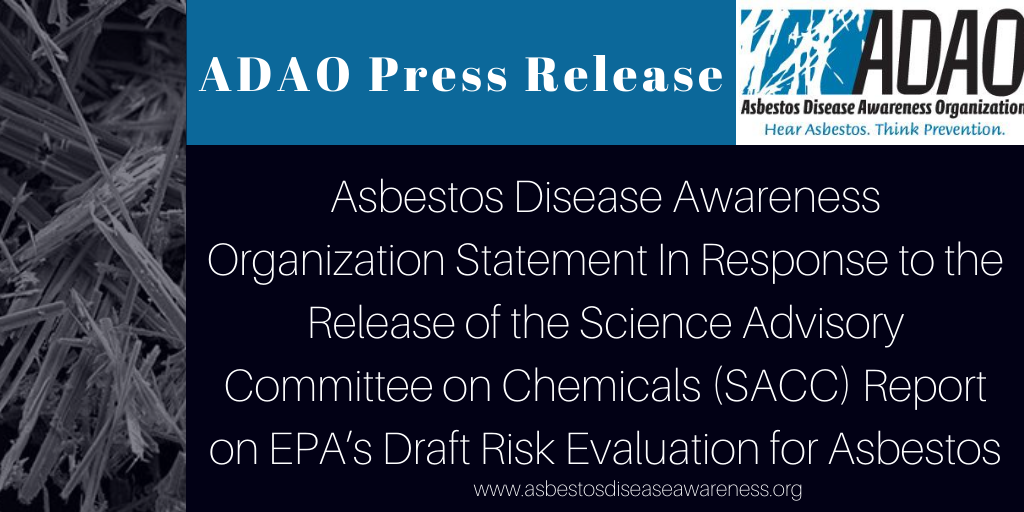For Immediate Release August 28, 2020
Asbestos Disease Awareness Organization Statement In Response to the Release of the Science Advisory Committee on Chemicals (SACC) Report on EPA’s Draft Risk Evaluation for Asbestos
EPA SACC deems asbestos risk evaluations inadequate
WASHINGTON, D.C. — Linda Reinstein, president and co-founder of The Asbestos Disease Awareness Organization (ADAO), released the following statement today following the Science Advisory Committee on Chemicals (SACC) Report re: the Draft Risk Evaluation for Asbestos. 
“Today’s Environmental Protection Agency’ (EPA) Science Advisory Committee on Chemicals SACC’s hard-hitting independent report confirmed what many asbestos experts and stakeholders had already concluded–that the EPA’s asbestos draft risk evaluation is fundamentally flawed and understates the serious risks of asbestos to public health.
“As the SACC reported, ‘Overall, EPA’s environmental and human health risk evaluations for asbestos were not considered adequate and resulted in low confidence in the conclusions. This is due to missing data for environmental exposures, coupled with the fact that current estimates for human health risk are created for a narrow group of workers and consumer users based on limited exposure to chrysotile asbestos fibers leading to numerous uncertainties.’
“ADAO is pleased the SACC Report confirmed expert testimony that the draft evaluation contained multiple omissions and exclusions. The draft asbestos evaluation:
- Ignored all but one asbestos fiber, chrysotile;
- Failed to consider known asbestos health effects, such as asbestosis and ovarian cancer;
- Did not address environmental pathways of exposure;
- Did not account for the risks of legacy asbestos present in millions of buildings across the US; and
- Made no effort to assess asbestos contamination of widely used consumer and industrial products containing talc.
“Four years ago, when President Barack Obama signed the Frank R. Lautenberg Chemical Safety for the 21st Century Act, we had hoped EPA would finally be able to protect Americans and ban asbestos once and for all. However, EPA has failed to rise to the challenge of using the new tools in the amended law to address the dangers of asbestos that have been well-documented for decades.
“Because of this failure, the next steps under TSCA will take years to complete. In the meantime, asbestos will remain in homes, schools, and workplaces; as well as on consumer shelves. Through all this, Americans will continue to be at risk from asbestos-caused diseases.
“The U.S. needs an asbestos ban without any loopholes or exemptions.
“We urge Congress to pass the Alan Reinstein Ban Asbestos Now (ARBAN) Act of 2019, a bill that would ban all asbestos imports and use within the first year of enactment, would provide Americans with the right to know where asbestos is imported and used, and would study legacy asbestos found in structures.”
###
About the Asbestos Disease Awareness Organization
The Asbestos Disease Awareness Organization (ADAO) is a global leader in combining education, advocacy, and community initiatives to prevent and end asbestos exposure. ADAO seeks to raise public awareness about the dangers of asbestos, advocate for an asbestos ban, and protect asbestos victims’ civil rights. ADAO, a registered 501(c)(3) nonprofit organization, does not make legal referrals. For more information, visit www.asbestosdiseaseawareness.org.
